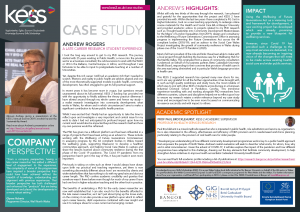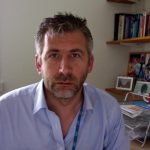
ANDREW ROGERS
A LATE CAREER RESEARCH STUDENT EXPERIENCE
I took the long way around to get to my PhD research. The journey started with 25 years working in Public Health; a move into the private sector as a business consultant; the odd excursion to work with the WHO or UN in the Balkans, Central Europe or Africa; and throughout I was fortunate to be able to input to postgraduate teaching at a number of Universities.
Yet, despite this rich career I still had an academic itch that I needed to scratch. Rhetoric and reality in public health are seldom aligned and one of the most theoretically supported models in public health, community development, has often struggled to get its full practical support.
In recent years it has become more in vogue, but questions remain unanswered about its full potential. KESS 2 funding has provided me with the opportunity to finally address the theory practice dilemmas I have skirted around through my whole career and hence my study – a realist research investigation into community development: what works in Wales, for whom and in which circumstances? aims to make a significant contribution to future public health practice.
Whilst I was excited that I finally had an opportunity to take the time to reflect upon and investigate a very important and central issue for my work to date I had not anticipated its profound impact upon how my current work would also be impacted beyond the research itself and how my own persona would be reframed.
The PhD has given me a different platform and has been influential in a range of projects that I have been acting as an advisor to. These include working with the Wellbeing of Future Generations Commissioner in assessing progress by the 44 compliant bodies in Wales toward the wellbeing goals, supporting Blaenavon to develop a healthier communities approach, and helping Social Care Wales to capture and share the lessons learned about community resilience during the first phase of the Covid 19 pandemic. The Covid 19 pandemic from my perspective hasn’t got in the way of this, it has just made it even more important.
Previously in taking on roles such as these I would always have drawn upon both my practical and teaching experience, yet there is now something discernibly different about how I am received by clients and wider stakeholders that has nothing to do with my grey hairs and obvious career length. The PhD confers academic credibility and gravitas that somehow wasn’t there before even though for much of my career I have had one foot in higher education teaching and the other foot in practice.
The benefits of undertaking a PhD for the early career researcher are now well established but I can also vouch for the benefits afforded to the late career researcher, as it isn’t just about tying up the loose ends, on the contrary it can also provide a new platform upon which to reflect upon career lessons, distil experience combined with new insight and use it to reshape ideas for a new current and emerging context.
IMPACT
Using the Wellbeing of Future Generations Act as a visioning tool and framework for development, a new exciting project has developed which was already promising to provide a new blueprint for wellbeing services. However, since Covid 19 has provided such a challenge to the way most services are delivered, it is now already becoming an inspiring vision of the changes that will need to be made across existing health, social care and wider public services.
Company Perspective
“From a company perspective, having a late career researcher has added a different level of engagement to the experience. The complexity of some of the programmes have required a broader perspective than could have been achieved without the breadth of knowledge, understanding and alignment with previous experiences. That broader perspective has both challenged and enhanced the “products” that are being developed and placed the developments in a more robust setting.”
Glynne Roberts
Programme Director, Well North Wales
ANDREW’S HIGHLIGHTS
Whilst still only two thirds of the way through the research, I am pleased and grateful for the opportunities that the project and KESS 2 have provided me with. Within the last two years I have completed a PG Cert in Higher Education, took on a new teaching opportunity to redesign online course materials for the Health and Social Care BA at Bangor University and provided academic advice to projects related to my PhD research such as Thought leadership into Community Development Masterclasses for the Mayor of London Inequalities Unit (2019); design and consultancy to the Wellbeing of Future Generations Commissioners Office in assessing progress in implementing the Future Generations Act across the 44 compliant bodies (2018/19); and an advisor to the Social Care Wales Project investigating the growth of community resilience in Wales during phase one of the Covid 19 Pandemic (2020).
Most of all I am proudest of the role and links I have been able to make with a local project through building the business case for a Wellbeing Hub for the Nantlle Valley. This originated from a piece of community consultation I undertook on behalf of my business partner, Betsi Cadwaladr University Health Board, responding to their concerns that provision of health care in the area was being diminished and in particular Welsh language provision in health care.
This KESS 2 supported research has opened many new doors for me, and I am very grateful for all the further opportunities it has brought with it, such as high quality workshops and study tours, the most notable of which was to join with other KESS 2 students across Europe in a European Industrial Doctoral School in Pardubice, Czechia. This immersive experience travelling with and working alongside PhD researchers from different countries, cultures and disciplines helped me to reflect upon how to ensure my research retains a wider relevance beyond my case study areas and encouraged me to be even more focussed on communicating its essence succinctly and with impact to others.
ACADEMIC SPOTLIGHT
Prof. Paul Brocklehurst
KESS 2 Academic Supervisor
Professor in Health Services Research
Paul Brocklehurst is a mixed-methods researcher who is interested in public health, role substitution and service re-organisation. He is also interested in the efficacy, effectiveness and efficiency of NHS provision and in needs-based work-force planning, particularly relating to the provision of oral health care for older people.
“Developing an understanding of how different community development programmes work is key to a public health approach that empowers the people of North Wales. Andrew’s realist evaluation will seek to describe ‘what works, for whom, how, why and in what circumstances’. Given the advent of COVID-19, it will also explore the impact of the pandemic and how different programmes have adapted to this challenge, drawing out the key elements that facilitate community development, to help strengthen future initiatives to improve health across Betsi Cadwaladr University Health Board”
You can read Paul’s full academic profile including a list of publications at: https://research.bangor.ac.uk/portal/en/researchers/paul-brocklehurst(e98d6eb9-1244-4239-9064-ed505e803c23).html

Knowledge Economy Skills Scholarships (KESS 2) is a pan-Wales higher-level skills initiative led by Bangor University on behalf of the HE sector in Wales. It is part-funded by the Welsh Government’s European Social Fund (ESF) convergence programme for West Wales and the Valleys. For further information about how your organisation could benefit from participating in KESS 2, please contact the KESS 2 Central team at Bangor at: kess2@bangor.ac.uk










